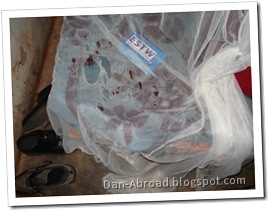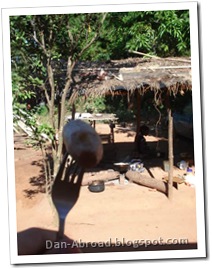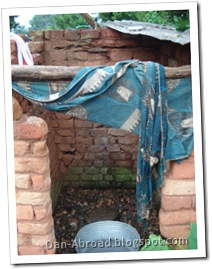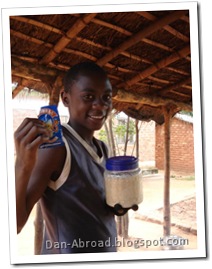I need to start this post with an apology. I'm sorry it's been such a delay between my first post and this, between distance to Internet, unreliable connections and computer glitches I've had trouble getting my first post up. But now that I've bested this hurdle I hope to be much more frequent in my correspondence.
The most natural thing to do, upon arrival in Lilongwe, Malawi would be to put together a post of first impressions detailing the dazzling disorientation of markets, inflated prices, experiences with white privilege, new foods (including a great hot sauce!) or the strangely intense sun (though Google tells me that Toronto and Waterloo are both stifling in comparison to the temperature here in Malawi). I've heard people describe their first experience in Africa as completely alien, like being in a movie, completely overwhelming or any combination of the three. After a couple weeks I don't think that any of that accurately describes what Malawi really is, or really feels like (thought I obviously can't speak for the rest of the continent, but only assume the same). For this reason I don't want to write a post about my first impressions because they're not really that representative of or relevant to my experience. Instead in the following paragraphs I want to outline what, after these few weeks are things I think will be lasting impressions* of Malawi (at least the 4 cities in Malawi I've been to thus far).
Right from my arrival it's been extremely evident the effect decades of NGO and other humanitarian activities have had on this country, and it's people. I was extremely taken aback when, while visiting a very rural area just outside of Mpamba (where I'm living with a very nice family) a child ran up to me shouting, "Mzungu Mzungu!" This is not at all an uncommon experience, as any white person who's been to Africa will tell you (and thankfully warned me). However, nothing prepared me for the child, in town in Mpamba (the village I'm calling home) who ran up to me, screaming "Mzungu!" who then, when I turned around bent down on one knee, presented me his upturned palm and said in a surprisingly demanding voice, "give me money". I was completely taken aback, but once able to temporarily get my wits about me again, I responded, exasperated, "Andalamma, andalamma" (money, money). He apparently found this hilarious, and we had a short conversation in my very limited Chitonga as I discovered that he'd completely used up all the Chizungu (English) he knew. I will leave you, the reader to decide what significance of this is, and I wish I could say it was an isolated incident, but I have been met with upward palms on many other occasions, most recently through the window of the minibus I rode to submit this post.
Another clear opinion that many Malawians I have come across, particularly outside the bottle store (Bar or Pub) that Foster, my Malawian counterpart owns is that, because I am a Mzungu, I must be somebody's bwana (boss). Thus despite my age, the bewilderment I can often feel expressed on my face and the flip-flops and dusty jeans I'm usually wearing I've very often been asked,
"Mzungu! Hey, good to know you. Ah yes, I am good. And how is your family? Sure, sure. . . Listen, I am looking for a job, can you help me?"
So I reply, usually through the smell of some beer, or cane spirit, "Umm... probably not. What kind of work are you looking for?"
"Ah, anything, I can do anything."
Now, despite the obvious notion that that is one impressive CV tempting me to say Anything? Wow, you should run for president then! I can't help wondering what seems to be stopping so many Malawians (as I seem to go through this very similar exercise at least every other day) from securing dependable employment. Or is this just wishful farmers hoping they can get out of what is definitely a very laborious profession and make more working for an NGO?
I make this observation because, from what I have seen and heard from many others the non-profit sector in Malawi doesn't just deliver "aid" but is an industry in of itself, employing vast numbers of people. My first dinner in Malawi myself and half of the Southern Africa Junior Fellows had dinner with a family of three in Lilongwe (the capitol city). The mother in the family was an extension agent with an NGO which EWB is partnered with helping farmers access fertilizer (among other things attempting to improve Malawian food security). Of her two children, her son is an accountant for World Vision, and her daughter works at a local university as assistant to a professor researching the AIDS virus. As you can see, this whole household is completely dependent on an economy supported by donor funding. An interesting thought.
This is clear (though anecdotal) evidence of how dependent the Malawian economy is dependent on foreign aid, here development is an industry in the truest sense of the word. It makes one wonder if the Malawian economy will ever function independently, and in how long?
Well, that was a very pessimistic view of what some of my experience has been, but really it has not been bad at all. Despite a few surprises, people in Malawi have been warm and really happy to have conversations with me in mostly English we me throwing in words from my limited Chitonga, which usually just leads to confusion.
As well, the stars here have been astounding. I don't think we've had a night that wasn't clear yet, and living in the city back home I always forget the beauty of the night sky. Every now and then Aaron, one of Foster's nephews laughs when he finds me swaying from the conversation in the evening (which is mostly in Chitonga, as Foster and his niece Veronica are the only family members truly fluent in English) to stare at the sky.
The Malawian food is something I'll not soon forget after leaving Malawi I am sure. Eating nsima (pronounced sima, or shima depending on where you are in Malawi) is truly a hands-on experience, and I'm still working on developing enough toughness on my right hand to pick up the maize, or cassava based ball of starch. I am quite certain though, that after only a few weeks I've exhausted the limited repertoire of Malawian cuisine and tasted every option there is to taste. Just the other night I fell asleep after being stuffed with maize nsima, completely full but fore some unexplained reason, intensely craving cinnamon. I suspect this is because, when it comes to spices salt is the only one any Malawian I have meet favours... and do they ever favour it! I am truly enjoying Malawian food, and am hoping to put together a collection or recipes... perhaps as a tab in this blog. If you think that would be something you'd like to see, leave a comment!
-Daniel
*Please feel free to argue in the comments whether even this is a better representation of Malawi, as I am definitely not thoroughly convinced myself
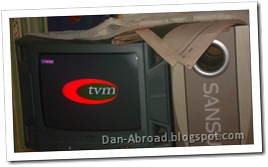 It's Sunday June 20th as I write this, and I’ve just finished eating dinner with my host mother and host cousin Aaron. Aaron turns on the TV because the second featurette in a series that the only public television station in the country, Malawi Television (TVM) has just started. The program is called Reach Out and Touch and the commentator tours around rural communities in a particular region of the country, this particular episode featured the northern region, and interviews people living in vulnerable situations such as child headed households, people in need of and without access to medical care and the elderly living in poverty without community support.
It's Sunday June 20th as I write this, and I’ve just finished eating dinner with my host mother and host cousin Aaron. Aaron turns on the TV because the second featurette in a series that the only public television station in the country, Malawi Television (TVM) has just started. The program is called Reach Out and Touch and the commentator tours around rural communities in a particular region of the country, this particular episode featured the northern region, and interviews people living in vulnerable situations such as child headed households, people in need of and without access to medical care and the elderly living in poverty without community support. 
